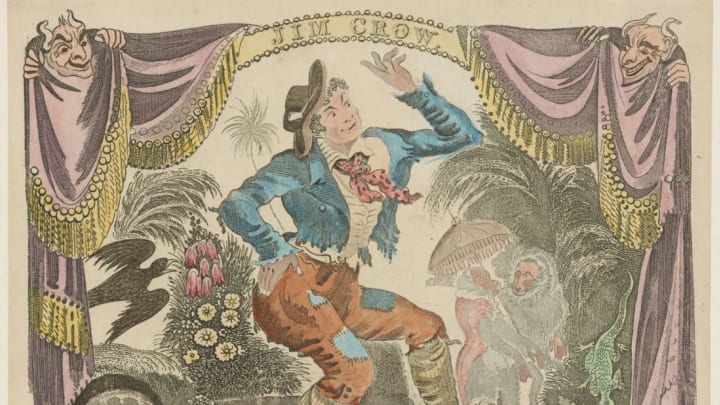The name Jim Crow appears throughout many U.S. history books. It's used in reference to both the laws that segregated Black and white Americans in the Southern United States and the region itself during the period when these laws were enforced. Jim Crow Laws and the Jim Crow South were very real from the late 19th through the mid-20th centuries, but a real person named Jim Crow never existed. The name comes from a fictional character used to perpetuate racist stereotypes before the Civil War.
According to Ferris State University, a white performer named Thomas Dartmouth Rice originated the Jim Crow caricature in the 1830s. Rice, known as "the Father of Minstrelsy," would don blackface and affect an exaggerated African American dialect while performing his musical act. Jim Crow was meant to be a racist stereotype of an enslaved person: Like many minstrel personas that came after him, the character was portrayed as a clumsy buffoon.
Though Rice didn't invent minstrelsy, his success helped popularize the stage show format. Inspired by Rice, other minstrel actors borrowed his Jim Crow routine, and soon whites were using the name as a derogatory term for African Americans.
Even after slavery was abolished and minstrel shows faded into obscurity, the Jim Crow character lived on as a label. According to History, the first Jim Crow laws were passed in the Reconstruction Period as a way to limit the rights and resources of newly freed Blacks in the South. Such laws imposed literacy tests on Black voters, segregated public schools, and made it legal for businesses to segregate their customers by race.
How exactly these laws became associated with Jim Crow is unclear, but the phrase Jim Crow Laws was being used by the late 19th century. An 1892 article from The New York Times used the wording when reporting on Louisiana's segregated railroad cars.
Though most people may not be aware of the name's origins, Jim Crow still comes up today when discussing this dark period in U.S. history and its lasting effect on the country.
Have you got a Big Question you'd like us to answer? If so, let us know by emailing us at bigquestions@mentalfloss.com.
